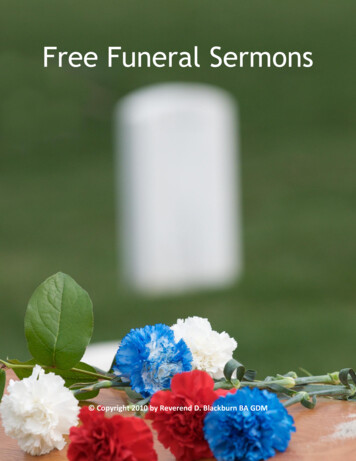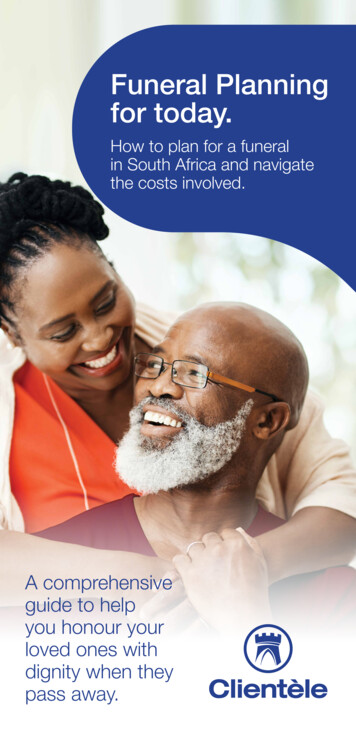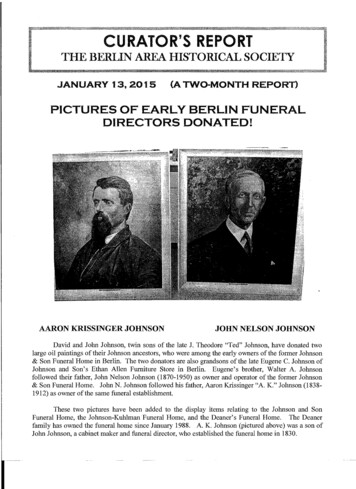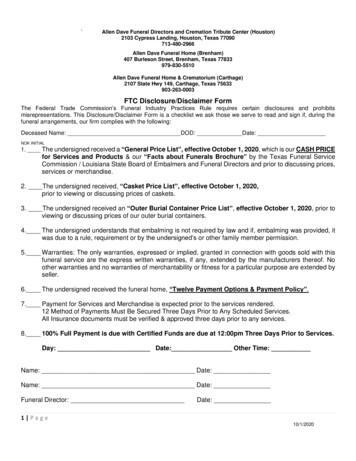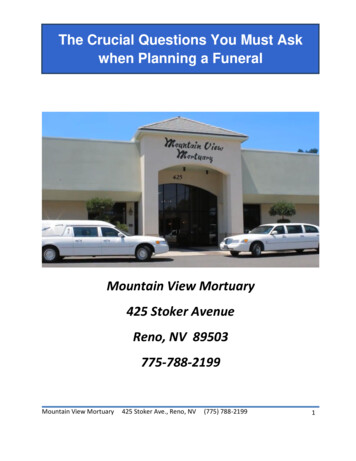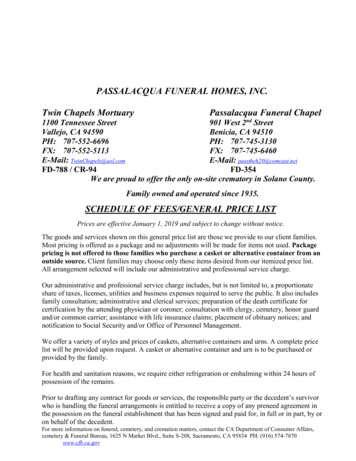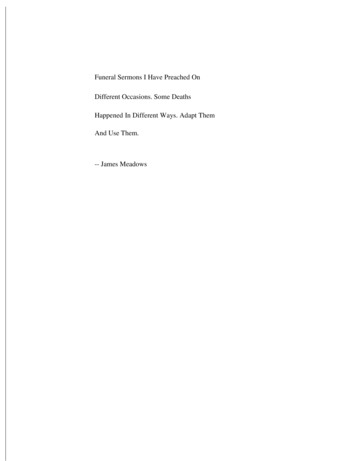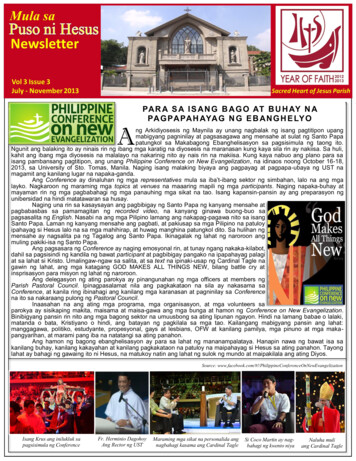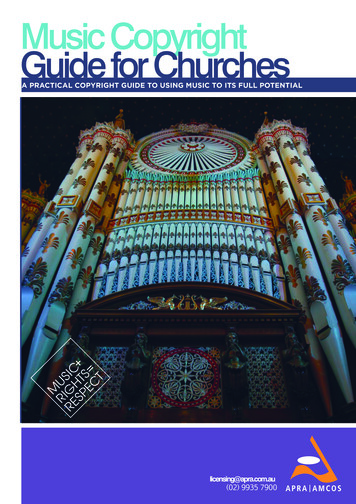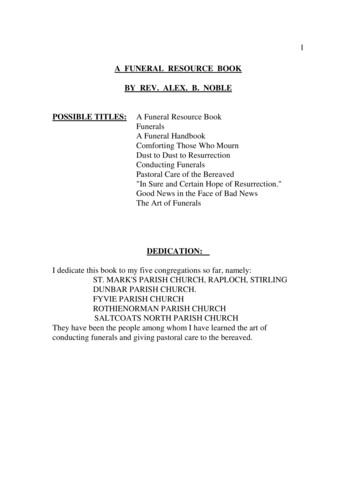
Transcription
1A FUNERAL RESOURCE BOOKBY REV. ALEX. B. NOBLEPOSSIBLE TITLES:A Funeral Resource BookFuneralsA Funeral HandbookComforting Those Who MournDust to Dust to ResurrectionConducting FuneralsPastoral Care of the Bereaved"In Sure and Certain Hope of Resurrection."Good News in the Face of Bad NewsThe Art of FuneralsDEDICATION:I dedicate this book to my five congregations so far, namely:ST. MARK'S PARISH CHURCH, RAPLOCH, STIRLINGDUNBAR PARISH CHURCH.FYVIE PARISH CHURCHROTHIENORMAN PARISH CHURCHSALTCOATS NORTH PARISH CHURCHThey have been the people among whom I have learned the art ofconducting funerals and giving pastoral care to the bereaved.
2ABOUT THE AUTHOR:The Rev. Alex. B. Noble was born on 23 May 1955 in Fraserburgh,Scotland and brought up in the twin Aberdeenshire fishing villages ofCairnbulg and Inverallochy. His father, George S. Noble was a fish marketauctioneer and businessman who became minister of Newarthill ParishChurch near Motherwell for twenty eight years.The author graduated M.A. (in English and History) from GlasgowUniversity in 1976, then B.D. (Honours in Systematic Theology) fromAberdeen University in 1979. After completing a Th.M. degree at PrincetonTheological Seminary in the USA he served as an Assistant Minister inSt.Ninian’s Parish Church, Corstorphine, Edinburgh. Alex. Noble wasordained as a Church of Scotland minister on 6th. January 1982 and inductedas minister of St.Mark’s Parish Church, Raploch, Stirling for over elevenyears. After six years as minister of Dunbar Parish Church in East Lothian,he became minister of the linked charges of Fyvie Parish Church andRothienorman Parish Church in rural Aberdeenshire. His present charge isSaltcoats North Parish Church in Ayrshire. In 1991 he married PatriciaWest from Fraserburgh, Aberdeenshire who was a college lecturer inBusiness Studies.In his twenty years as a parish minister in various types of charges rangingfrom city to urban priority area to small town to rural villages and farms, theauthor has conducted well over 600 funerals. Visits before and afterfunerals mean that bereavement and death have been a daily part of his lifeand ministry and a particular interest within his general vocation. In 1999his first book, entitled “Sunshine Through Shadows” was published by theSaint Andrew Press. It is a companion volume to this one in that it iswritten mainly for those who are bereaved and in grief while this one iswritten especially for those who seek to comfort them.
3CONTENTS.A. THE FUNERAL SERVICE.1. Arrangements2. Beginning Funerals3. Opening Sentences4. Hymns and Music5. Prayers6. Readings7. Poems8. Parables9. Eulogies and Prayerful Life Stories10. Silence11. The Committal12. Benedictions13. Particular Types of Funerals14. Scattering or Burying AshesB.1.2.3.PASTORAL CARE.Before the FuneralDuring the FuneralAfter the FuneralC.1.2.3.4.5.6.7.8.9.ISSUES RELATED TO FUNERALS.Legalities and PracticalitiesFees and GiftsNo Private FuneralsThe Minister-Undertaker RelationshipA Note Regarding UndertakersExtra Bits and Handling Awkward CustomersGoing Back For TeaGrief and BereavementTheology Of DeathAPPENDIX 1 A Complete Funeral in the Light of All the Above.APPENDIX 2 A Letter to Someone Recently BereavedBIBLIOGRAPHY
4A. THE FUNERAL SERVICE.1. ARRANGEMENTSFrom the point of view of the minister or anyone who is conducting afuneral, in any capacity, the funeral begins as soon as the telephone rings orthe doorbell chimes. (No wonder then that ministers sometimes get aphobia about ringing bells)! Ideally there is a relationship with the deceasedand some members of their family before the death, but unfortunately oftenthere is not.The door or phone bell rings and in an instant, life is changed! You may bewashing the dog or playing with the baby; having a domestic row or beengaged in creative writing; perhaps watching your favourite televisionprogramme or absorbed in a pet project, but someone else's tragedy is yourinterruption. “Interruption” of course is not a healthy way to look at it.This is what we are called by God to do and it is our great desire andprivilege to bring comfort to those who mourn (see Isaiah 61.1-3). Still,there is no getting away from the fact that in the twinkling of an eye youhave to “go up the gears” and operate in a pastoral way (like it or not at thisparticular moment). This may incur the wrath of the dog, the children, yourspouse or simply other aspects of your complex self other than the zealousworkaholic!I was trained to always drop everything (within reason) and immediately runround and visit the bereaved family. I never really got a good explanationof what might be considered "within reason" nor indeed "beyond reason".That is the big question; that is the question which, if answered incorrectly,can cause immense personal stress and considerable marital strain even tothe extent of divorce! We wear more than one hat and we haveresponsibilities in more than one direction, so we have to deal with the callfor our services with more sophistication than simply always sublimating allthings to rushing round to visit the funeral house.The other side of this coin is that quite often it turns out that the bereavedfamily does not want you round immediately. The death may just haveoccurred and they want to buy breathing space before meeting you or indeed
5anyone. They may not know you and so they will have the stress of relatingwith a stranger at a time when they do not feel up to such an exercise ofsocial skills. Even if they do know you, they may not want to answer a lotof questions. Furthermore, you represent the funeral of their loved one andthe stark reality of death which are the very two things which a large part ofthem is busily trying to deny and block out. Often they are already out andabout registering the death, buying black ties, closing bank accounts etc.All of this is stressful, especially within hours of the death, and so they haveto psyche themselves up for it. Your unannounced arrival means that theyhave to psyche themselves up all over again. (Usually they can't settle untilthey have registered the death).For all these reasons there is much wisdom in thinking twice before rushinground to the bereaved family. I usually now telephone people first tointroduce myself and ask when it would be most convenient for me to callround. I specifically mention the possibility of coming round right away (ifthat is at all possible for me to do) but then leave them to make the choice.More often than not we fix up an appointment later that same day but notright away. This also has the advantage that the chief mourners can gatherthe wider family (if they wish) so that they can all meet the minister and beinvolved in any family discussions. Conversely it also gives them time toget rid of any family or visitors whom they do not want involved!Sometimes when I telephone, the mourners express their preference formeeting me at my manse rather than in their own home, so I now offer themthis choice. This can be because of noisy dogs or children or certainmembers of the family or friends who might cause embarrassment. For allthese reasons the phone call gives the family and the minister much moreflexibility."As far as possible" I try to come round immediately. This phrase howeverhas been reinterpreted at every stage in my ministry. As a zealous, youngbachelor in my first charge I went round immediately almost withoutexception. Now, as a zealous, middle-aged married man, I find that thereare more exceptions! I still frequently face the phenomenon of "going upthe gears" as when you come home from the Sunday School picnic hot,sticky, sunburnt and tired, just dreaming of a long cool drink and calaminelotion, then just as you are putting the car into the garage, someone shouts:"It's the phone for you; it's about a funeral!" You know that you have toquickly leap from plodding mechanically towards that vision of the cool
6drink in the fridge, to calming the fevered brow of others with much biggerproblems than yours. It is a huge psychological journey but you have totraverse it and do so in only seconds before speaking to the mourners!As always, your function is both a task one and a relational one and it isprimarily relational. On the face of it you are meeting for the task ofmaking practical funeral arrangements. That however is the least of it.There is so much more to the funeral visit than simply agreeing where, whenand how to hold the funeral.Very often the person conducting someone's funeral has never met thatperson nor indeed the mourning family and friends. Isn't that an amazingfact? Fortunately it does not mean that the funeral is doomed from theoutset to being an empty and mediocre exercise. However it does mean thata lot of relating has to be squeezed into a very short time and at a verystressful time. This is quite a challenge! It is a challenge from both sides:the minister faces the prospect of saying meaningful things to people withwhom he has little or no pastoral relationship and they are looking forcomfort from a relative or absolute stranger. Furthermore, the daysfollowing news of a loved one's death and the days leading up to a funeralare not the best times for making new and meaningful relationships. Butsuch is life! And such is death too! I must confess to a sneaking liking forthe challenge to my professionalism in all this. I have three daysapproximately to get to know these mourners and to get to know thedeceased retrospectively!It is not even three days, more like one or two visits. Sometimes I visit onlyonce before the funeral and sometimes I visit twice. There is no scientificreason for the difference; it is more an intuitive thing and above alldependent on practical circumstances. I might visit twice if I know thefamily very well or if they are core Church people. Conversely it might bebecause I didn't know them and didn't get enough information from onevisit. Sometimes it is because some of the relatives are flying in from faraway and would like to meet me and sometimes it is simply because I haveless commitments and some time available for a second visit.During the visit or visits I try to get as much information about the deceasedas I can without being seen to be grilling them. The day a loved one dies isnot the ideal time to be getting interrogated and not a good day for getting
7your facts right. However the more facts I can get the more personal I canmake the funeral so it is a case of short-term pain for longer-term gain.After the funeral they see that, but before it they find it hard to understandwhy you are asking all these questions and in some cases they find it a littledistressing. Of course, over the years I have worked at perfecting thetechnique of the imperceptible inquisition! It is a matter of intuition andprofessional skill to know just how much questioning they can stand.You can extract data reasonably imperceptibly by listening very intently towhat others say and so avoiding the need for you to be seen asking thequestions. You can ask other people besides the immediate family e.g.friends, neighbours, colleagues, Church members, even the undertaker(especially in small communities). You can harness mourners' natural andhealthy impulse to speak about their deceased loved one - just start them offand occasionally prod with the right noises and they will reel off endlessanecdotes and memories. A room full of mourners will trigger each otheroff with their respective memories and you can "chair" the discussion with avery light touch.I make a point of gathering facts about the person who has died rather thanvalue judgements. Facts are relatively safe while value judgements are verydangerous. I remember attending my own aunt's funeral and feeling veryupset (along with the rest of my family) as the pastor painted a picture of herwhich none of us recognised. It is a very hurtful thing. Even facts can havetheir complications but on the whole I feel that they are worth the risk.Facts go wrong when people (in grief remember) give you wrong facts (e.g.saying they had five children when in fact they had six). Facts getcomplicated when for example a person has married twice and one half ofthe family do not want his first wife mentioned at all! These difficulties canall be overcome with tact and diplomacy and the benefit of giving simplefacts which the hearers themselves adorn with their own memories andvalue judgements is inestimable. The feedback which I have always had isthat the prayer in which I give a brief, thumb-nail, outline sketch of the factsof the deceased's life story is the "best bit" of the funeral.On the other hand, while avoiding value judgements, it is always my aimnot only to get facts but also to get inside the late loved-one's personalityand inner psychological workings. I try to get a feel for the person so thateven in the case of someone whom I have never met, I can match the feeling
8of the funeral service to their unique character. This is difficult for me toput into words and even harder for the families to notice and express but Iam delighted when I get feed-back which touches on this. For examplepeople have thanked me in the following terms:"You summed her up to a tee.""It was as if you had known him all your life!""How long did you say you knew them?""So and so [the deceased] would have really appreciatedthat bit you mentioned about the.""My mother would really have approved of that service;it just felt so much her style!"One funeral in particular comes to mind. I think I have only twice evercracked a joke during a funeral - because it is not really the thing to do 999times out of a 1,000 - but I did on this occasion. Afterwards the familycommented on my joke saying:"We really appreciated what you said there. Dad wouldhave approved. It was just the sort of thing that he alwaysliked doing in company. He had a great sense of humourand we're sure if he's watching he'll be having a goodlaugh to himself."The risk paid off in this case. However the risk is dangerous - you aredealing with the emotions of people when they are at their most vulnerableand when they are beginning to build trust in you and all that you represent(including God Himself)! On the other hand there is always the odd casewhich is the exception to the rule as in the above example. The point is thatI must have been very sure of my reading of the family in order to havetaken such a risk. The rule of thumb must be: "If in doubt, don't" but look atthe joy and comfort which you can give to families by hitting "just the rightnote" (as they say) if you can master the skill of reading both the deceasedand their family. I say both because the above would not have worked if thefamily had not inherited their father's sense of humour. It is no good if thedeceased would appreciate the funeral service but the living mournerswhom you are addressing would not!The funeral visit (or visits) is therefore not only a time to makearrangements about which hymns to sing. It is also a short but concentratedopportunity to "connect" with strangers or people whom you know only alittle and probably never at this depth before. We should go in then with
9eyes and ears fully open looking and listening intently like all goodcounsellors, truly perceiving and rightly discerning. We should treat peopleas we find them. No, we should do much better than that for we are notlikely to find them at their best in the initial stages of grief! Above all, weshould go to people with an open heart to love and care and we should try tobe an open valve so that their thoughts and feelings can flow upward to Godthrough us (e.g. in prayer) and the love and enabling power of God can beable to freely flow through us to them. Then we can be instruments andchannels of God's grace and peace. Funerals are a wonderful opportunitynot to preach at people but to give them perhaps their first real experience ofthe grace of God.As a parish minister I am often asked to conduct funerals of people whohave seldom if ever crossed the thresh-hold of the Church and conductfunerals for people who will probably never cross the thresh-hold againafter the service. Sometimes people say:"These people are only using the Church or even abusing it."I don't see it that way. People are never likely to want to go to Church andworship God unless they can see a good reason for doing so. First they needa good experience of the grace of God and then they will want to praise andthank him. We preach best by conveying God's love and acceptance andenabling strength.Sometimes when making the funeral arrangements you begin to wonder:"Who's funeral is it anyway?"This is a very good question! Grief only serves to highlight people's normalcharacter traits so sometimes you meet indecisive, tentative people and atother times domineering strong willed people. At times mourners are verydeferential and at others quite demanding. Some like to make a drama outof a crisis while others are wanting it all over in three minutes. Even thesame individual can be full of ambiguities as when they begin by saying thatthey want it all to be very short and simple and then go on to inundate youwith special requests for little additions. Organists and undertakers havebeen known to "put in their tuppence worth" and even the deceased candictate from the grave via their pre-written will or in those famous lastwords. How often we hear:"It was his express desire that.""It was her dying wish.""It was their favourite piece of music."
10Sometimes one member of the family (and not necessarily the nearest anddearest) exerts a disproportionate influence on the rest of the family eitherbecause the family is indecisive or because the person is a forcefulcharacter.So it is a very good question: "Who's funeral is it anyway?" Obviously thedeceased is a major attraction while various others mentioned above alsoplay leading parts! The person conducting the service clearly has much ofthe spotlight and the major speaking role. However it should always beremembered, and reminders given if necessary, that GOD is the numberone! A funeral is after all an act of worship and it is God whom we areworshipping. We thank Him for the life of the deceased; we ask Him to bethe Good Shepherd as He promised and lead us "through the valley of theshadow" of grief; and we praise Him for the "sure and certain hope ofresurrection" and the hope of Heaven. We sing to Him and pray to Him andlisten to His Word. This fundamental point needs to be kept in mind whenmaking arrangements for any funeral service. It Is God’s service.Having said that, I do, like most people, try to accommodate all thecompeting desires and requests as far as possible. The bounds of course arehard to define but include judgements based on what would God like, is itworship, is it in good taste, in accordance with common sense, appropriateto the deceased, acceptable to most mourners, achievable within the timerestraints? It can depend on who exactly is making the special request or onhow strongly they want it. Since I try to have unity of theme in every act ofworship I prepare, it can depend on whether it fits in with every other part ofthe service. On balance I think it is worth losing a little control and a littleof your own high standards in order to let the immediate family feel that theservice is a joint production between them and the minister. This can stressthe minister because he or she is used to total control of their services but itdoes make the funeral service much more effective when people feelparticipant rather than spectator. For this very reason many ministers areletting go of some of their control of Sunday morning services as well asfunerals. Of course the more you let other people have a say the more riskthere is of complications and frictions. Personally I like to retain nearly allthe control, but I also even enjoy the challenge of co-operating with familiesand creatively weaving what I say around requests which they have.However I do not like the growing "consumer attitude" which throughoutmy ministry has been increasing. We live in a materialistic age in which the
11prevailing philosophy seems to be "the customer is always right" and"everyone is here to serve the customer" or "you get what you pay for". Irefuse payments for funerals partly because I refuse to be tipped. Therelationship between minister and mourner is NOT about customers payingfor services rendered. I am God's man and I do the funeral in service toHim. I serve Him by helping others. However I am not the others'employee.So, to recap, the initial funeral visit (and sometimes a second visit) is tomeet the immediate family of the deceased and express my sympathy. It isto establish a pastoral relationship out of which I speak at the funeralservice. The visit furnishes me with a good picture of both the deceased andthe family and I glean relevant facts about the person who died - facts whichI use in a prayer to guide people's memories as we go through a summarysketch outline of the deceased's life. I also use the new-found knowledge tocraft a parable or two to enlighten and comfort the mourners at the funeral.We also discuss the practical funeral arrangements and details of theservice, especially the hymns.2 BEGINNING FUNERALSFirst impressions in life are always very important, indeeddisproportionately important. This also applies to funerals. The firstimpression begins even before the first words are said by the personconducting the funeral. Things like the decor, the warmth of welcome, theseating positions, the temperature, lighting, the music or silence, where theminister stands in relation to the mourners (eg. high up "six foot abovecontradiction" or nearby at a small lectern), whether the minister wearsrobes or not, eye contact before you begin, the atmosphere etc. - all have aninfluence upon first impressions and are therefore worth thinking about indetail.When it comes to communication we generally put too much emphasis onthe spoken word and underestimate the importance of all the other aspectswhich contribute to a complete communication exercise. Experts tell us thatonly 7% is communicated by the spoken word while 93% has to do with
12body posture, hand gestures, facial expression, eye contact, tone of voiceand so on. If you go to a concert you will notice that there is much more tothe event than simply what the star of the night says or sings. Besides the“star quality” there is the expectancy of the crowd, the appearance of thetheatre, its warmth and comfort, the size of the crowd, the shape of the seatand amount of leg room, the warm-up acts etc. The same facts of life holdtrue whether it is in a concert hall, a cathedral or a crematorium becausepeople use their five senses wherever they go. Often the non-verbalcommunications are the most vivid in the memory and have the most impactat the time.Some ministers prefer to mingle with the mourners and greet the chiefmourners at the door of the church. I however do not as a rule (althoughthere have been odd exceptions). I pop up in the pulpit or to be moreprecise at the lectern (because it is nearer to the mourners and thereforemore intimate and less “high and mighty”). There is a delicate balance to bekept between being too remote and too near; too formal and too informal;too involved and too detached; too much one of the mourners and too muchnot one of the mourners. This calls for intuitive decisions and valuejudgements and such decisions will vary from funeral to funeral. GenerallyI give my best pastorally before and after the funeral but during it I amperforming a particular role which I feel is best served by keeping a littledetachment including popping up at the lectern. At the point of the funeralservice the mourners are better served by a slightly detached officialfunctionary than someone who is simply another broken-hearted griever.(That is a little over-stated but it draws out the distinction). I have learnedone little “trick of the trade”: when I feel a little too detached, I look into thechief mourner’s eyes until I judge that I am filled up enough with emotionalinvolvement! Then I avert my eyes. Conversely, if I feel too emotional I donot focus on the mourners’ eyes but just give them indirect eye contact untilI feel detached and strong enough to give them direct eye contact.I do not lead in the coffin at any time for I see no good reason for doing so.I do not stand as part of the coffin party nor the party of mourners; I am in aunique position and I therefore stand alone reflecting that. When you thinkabout it I am standing there as God’s ambassador representing Him so Istand with the Bible, lectern and the invisible Presence.
133 OPENING SENTENCESWhen it comes to opening words I nearly always say:“The Peace of the Lord Jesus Christ be with you all.”I emphasise the word “peace” and say it slowly, authoritatively,onomatopoeically and with full but gentle eye contact. The fact of startingnearly every funeral this way also means that regular attenders have thecomfort of a familiar starting note. There surely can be no better startingnote than the catch phrase of Jesus Himself! Jesus was always saying:“Fear not; it is I, peace be with you.”He said it for example as He came walking over the water towards thedisciples and He said it when He made His Resurrection appearance to thedisciples in the upper room.I deliberately say: “The peace of THE Lord Jesus Christ” rather than:“The peace of OUR Lord Jesus Christ” because I am very conscious of thefact that many attenders are not worshippers. They did not choose aChristian funeral in a Church but when given hobson’s choice they chose tocome rather than be absent. Often you can see them willfully refusing tosing the hymns!On the other hand I find that it serves me well to make no value judgementsexcept to blindly assume that everyone is Christian. It is not for us to judgeother people. Judging is so difficult anyway, and remembering that manypeople positively disbelieve, while others hesitantly believe and still othersare confused about what the do and don’t believe, it pays to speak “a wordfrom the Lord” and forget all about these matters. I never cease to beamazed by how many people profess to be non-believers yet end up givingprofuse thanks for unapologetic prayer and preaching!A case in point comes to mind. Once I was asked a strange request by awidower. I had been asked to conduct his wife’s funeral and had willinglyconsented. Then he said:“Minister, do you mind if I ask you a wee favour?”I said: “No, what is it?”He replied: “Do you think you could skip the God stuff?”Seeing me metaphorically “fall off my perch” in a mixture of laughter andsurprise he went on to explain that neither he, his wife, nor their family were
14“very religious”! I immediately composed myself and said in all sinceritythat if he did not want a religious funeral he did not have to have one. Ipointed out the not so well known fact that anyone can bury anyone inScotland. You do not have to have a minister. Indeed there is a growingtrend for non-Christian funerals and even funerals which have no spokenwords and even nothing at all remotely like a service or remembrance act. Iwent on to point out that ministers do religious, indeed Christian, services –it comes with the package! Without the Christian Good News of God beingwith us and His guarantee of resurrection I would have nothing to say. Hepaused for a moment then said:“Oh well then, just you do it your usual way.”I did do it in my usual way and I am pleased to say that before I stepped offthe planks over his wife’s grave he came rushing over to me to thank me forthe lovely service!Very quickly in my ministry I came to see that many people come tofunerals and feel completely bemused by the whole exercise. They don’tknow what a funeral is; why we have them; what they are trying to achieveand basically what they are all about. At other times we would introduceproceedings andexplain a little about what is going on. So why not also do that at a funeral?There is a slight danger of being repetitious for regular funeral attenders buteven that has the advantage of a familiar comfort. There is a time and placefor originality but there is similarly a time and place for familiarity. In griefpeople like the comfort of familiar things (hence the popularity of singingPsalm 23 to the tune Crimond). So, very often I begin with these words:“The peace of the Lord Jesus Christ be with you all.We are gathered here today to mourn the loss and to celebrate the lifeof .We are here to give thanks to God for his/her life of years andTo commit him/her back into God’s merciful and tender hands.We are here to comfort one another and to be comforted ourselves.We are also here to praise and thank God that in the face of the cold,stark mystery of death and the valley of the shadow of grief themanyquestions on our minds and the mixture of feelings churning aroundinour hearts there is the Good News of Jesus who said, and still says:
15- “Blessed are those who mourn for they shall be comforted.”- “He who comes to me I will not cast out.”- “I am with you always, even to the close of the age.”- “Come unto me all you who labour and are heavy laden,- and I will give you rest.”In a world of change and uncertainty .when you never know whatwill happen next one thing is trustworthy and reliable, sure andsteadfast, (an anchor to the soul) and that is a promise of our GodJesus.So, in our weakness, sorrow and need, let us lay claim to thesepromises.On other occasions I like to start with a reading from scripture e.g. Jesuscalming the storm or Peter walking on water. The sudden abrupt delvinginto the Bible is part of the effect. Then I make the obvious connectionbetween the situation then and our situation now.Sometimes I begin with a parable. At other times I
A FUNERAL RESOURCE BOOK BY REV. ALEX. B. NOBLE POSSIBLE TITLES: A Funeral Resource Book Funerals A Funeral Handbook Comforting Those Who Mourn Dust to Dust to Resurrection Conducting Funerals Pastoral Care of the Bereaved "In Sure and Certain Hope of Resurrection." Good News in the Face of Bad News The Art of Funerals DEDICATION:File Size: 761KB
